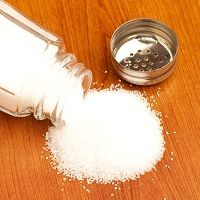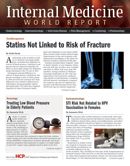Publication
Article
Internal Medicine World Report
The Parable of the Salt and the Evolving Medical Consensus
Author(s):
Changes in the way we think about sodium intake and cardiovascular risk, calcium supplementation, and other topics should remind us all of the advice we heard on the first day of medical school: 50% of what you learn here is wrong or going to disappear over your career; we just don't know which 50%.
Real knowledge is to know the extent of one's ignorance. - Confucius

The training we enjoyed in medical school focused on understanding pathophysiology as a logical way to understand treatment. This process is intellectually very satisfying. You have an infection; take an antibiotic, and you should resolve the infection. Blood pressure (BP) is elevated, and hypertension is a cardiac risk factor; so lower the BP, and lower your risk for a cardiac event.
This rational approach to health care often holds true, but not always. Thanks to the methods of meta-analysis a number of long-held medical assumptions are challenging what most would consider standards of care.
Consider salt restriction to lower cardiovascular adverse outcomes. In 2013, the Institute of Medicine published a study on the influence of salt restriction on patient outcomes. As expected, reducing salt consumption slightly lowers blood pressure. But salt restriction resulted in no evidence of reduced risk of myocardial infarction, stroke, or death. A meta-analysis from 2013 covered 34 clinical trials and verified the short term benefit of salt restriction; doing so decreased systolic BP by over 5 mmHg, and diastolic by just under 3 mmHg. But its long term effects were an increase in renin activity and aldosterone.
And in 2014, a meta-analysis of 275,000+ patients found that aggressive salt restriction (< 2,500 mg/day) increased risk of cardiovascular outcomes and all-cause mortality compared to “usual” sodium intake (2,500-3,800 mg/day). It also found that usual intake lower risk compared to “high” intake (3,800-5,000 mg/day). This means using your salt shaker is unlikely to get you into that “high” intake category. To increase risk for the patient without congestive heart failure or renal insufficiency, you need to eat large quantities of prepared foods on a daily basis (ie, canned foods, fast foods, or restaurant meals to which salt is added in large amounts).
“Low salt” intake increases both cardiovascular and all-cause mortality risk? The high intake data make “sense” logically; the low-intake data do not. This should remind us all of what we likely heard on the first day of medical school: “50% of what you learn here is wrong or going to disappear over your career; we just don’t know which 50%.”
For most of the last 15 years, calcium supplementation was recommended to prevent or slow the progression of osteoporosis for post-menopausal women and anyone at risk of osteoporosis. This came from the US Preventive Services Task Force, the most objective, evidence based preventive medicine authority in the United States. In 2013, they released an update to this recommendation stating there was “insufficient” evidence to support calcium supplementation for all; even in post-menopausal women.
Why this change? It makes good logical sense; as you age, you lose bone calcium; add more to the diet and at a minimum, you slow that progression. In 2010, a systematic review of both men and women found that calcium supplementation increased the risk of myocardial infarctions. In 2012, an observational study found that calcium supplementation did not improve hip or lumbar bone mineral density after age 50 years and made no conclusions about age less than 50 years. And a large cohort study of women found calcium supplementation increased risk for both adverse cardiovascular outcomes and an increased risk for all-cause mortality. In short, calcium supplementation did not make bones better, and may have made other adverse outcomes worse.
How do these findings change my practice? I no longer recommend salt restriction (unless the patient has heart failure, renal insufficiency, or is eating every meal prepared by someone else). I tell them they can use their salt shaker if they cook their meal from scratch. I do not encourage calcium supplementation, and talk to my patients who use a roll of antacid tablets a day.
And I use these changes to remind myself this is 21st century medicine, where logical application of pathophysiology is just the starting point for medical inquiry. Large population studies will continue to inform, and change, how we treat patients. And as things change, I am happy to learn which 50% was not correct. The older I get, the more I learn the extent of my ignorance.
About the Author
Frank J. Domino, MD, is Professor and Pre-Doctoral Education Director for the Department of Family Medicine and Community Health at the University of Massachusetts Medical School in Worcester, MA. Domino is Editor-in-Chief of the 5-Minute Clinical Consult series (Lippincott Williams & Wilkins). Additionally, he is Co-Author and Editor of the Epocrates LAB database, and author and editor to the MedPearls smartphone app. He presents nationally for the American Academy of Family Medicine and serves as the Family Physician Representative to the Harvard Medical School’s Continuing Education Committee.






